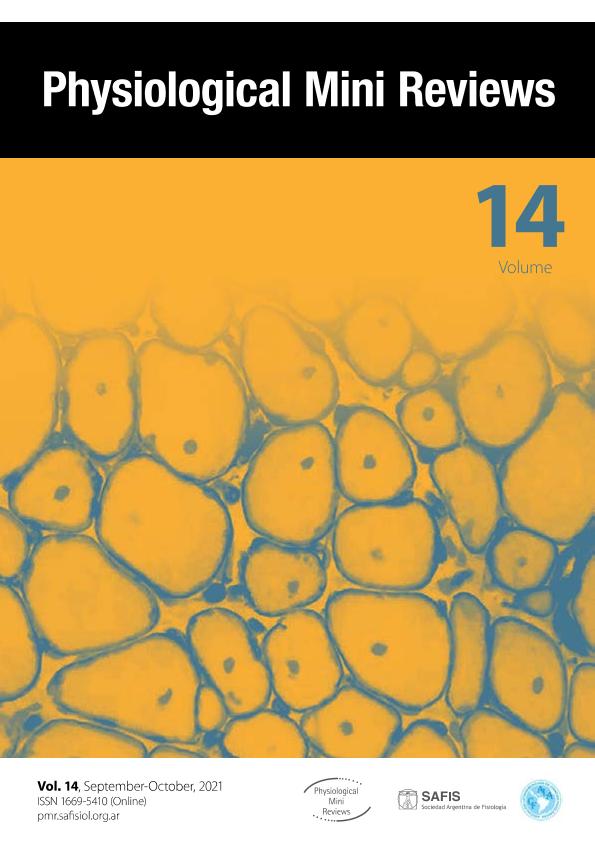Mostrar el registro sencillo del ítem
dc.contributor.author
Ferrero, Paola Viviana

dc.date.available
2023-09-20T18:32:41Z
dc.date.issued
2021-10
dc.identifier.citation
Ferrero, Paola Viviana; How similar are you to the fruit fly?: Drosophila melanogaster as model for studying human diseases; Sociedad Argentina de Fisiología; Latin American Association of Physiological Sciences.; Physiological mini reviews; 14; 5; 10-2021; 14-24
dc.identifier.uri
http://hdl.handle.net/11336/212412
dc.description.abstract
Drosophila melanogaster is a holometabolous insect with a short life cycle. Its genome is completely sequenced, and it is easy to grow in the laboratory. More than 120 years of history using Drosophila have allowed us to clarify the inheritance laws and to understand cellular and molecular mechanisms of mammalian development in this model. Approximately 75% of the genes responsible for several human diseases have homologs in the fruit fly. This work addresses some advantages of using this model organism for human pathophysiology studies. Neurodegenerative disorders, heart disease, and nephropathies can be modeled in transgenic organisms, affecting the homologous gene or expressing the human sequences. It is also possible to study multi-organ pathophysiological conditions such as aging, diabetes, and cancer. In addition, Drosophila has been used to explore substances of human consumption such as cocaine, methamphetamine, caffeine, alcohol, tobacco, and cannabinoids. Finally, the versatility of this organism and the knowledge of its genome have made it possible to undertake large-scale pharmacological studies to learn about the interactions between substances and genes, to find new drugs.
dc.description.abstract
Drosophila melanogaster es un insecto holometábolo que presenta un ciclo de vida corto; su genoma está completamente secuenciado y es muy fácil de criar en el laboratorio. Más de 120 años de historia utilizando a Drosophila han permitido clarificar las leyes de la herencia y entender algunos mecanismos celulares y moleculares del desarrollo del mamífero en este modelo. Aproximadamente el 75% de los genes responsables de ciertas patologías humanas tienen homólogos en la mosca de la fruta. Este trabajo aborda algunas de las ventajas de utilizar a Drosophila melanogaster como organismo modelo para estudiar la fisiopatología humana. Con el uso de organismos transgénicos que tienen afectado uno o más genes homólogos, o que expresan genes humanos, se pueden modelar diferentes enfermedades neurodegenerativas, cardiopatías y nefropatías. También es posible ahondar en el estudio de condiciones fisiopatológicas multiorgánicas como por ejemplo el envejecimiento, la diabetes y el cáncer. Además, se ha utilizado a Drosophila para estudiar sustancias de consumo humano tales como cocaína, metanfetamina, cafeína, alcohol, tabaco y cannabinoides. Finalmente, la versatilidad de este organismo y el conocimiento de su genoma han permitido abordar estudios farmacológicos a gran escala, para conocer las interacciones entre las sustancias y los genes, con el objetivo de diseñar nuevos fármacos.
dc.format
application/pdf
dc.language.iso
eng
dc.publisher
Sociedad Argentina de Fisiología; Latin American Association of Physiological Sciences.
dc.rights
info:eu-repo/semantics/openAccess
dc.rights.uri
https://creativecommons.org/licenses/by-nc-sa/2.5/ar/
dc.subject
DROSOPHILA
dc.subject
HEART
dc.subject
DISEASES
dc.subject
MODEL
dc.subject.classification
Otras Ciencias Biológicas

dc.subject.classification
Ciencias Biológicas

dc.subject.classification
CIENCIAS NATURALES Y EXACTAS

dc.title
How similar are you to the fruit fly?: Drosophila melanogaster as model for studying human diseases
dc.type
info:eu-repo/semantics/article
dc.type
info:ar-repo/semantics/artículo
dc.type
info:eu-repo/semantics/publishedVersion
dc.date.updated
2023-09-18T13:28:41Z
dc.identifier.eissn
1669-5410
dc.journal.volume
14
dc.journal.number
5
dc.journal.pagination
14-24
dc.journal.pais
Argentina

dc.journal.ciudad
Buenos Aires
dc.description.fil
Fil: Ferrero, Paola Viviana. Consejo Nacional de Investigaciones Científicas y Técnicas. Centro Científico Tecnológico Conicet - La Plata. Centro de Investigaciones Cardiovasculares "Dr. Horacio Eugenio Cingolani". Universidad Nacional de La Plata. Facultad de Ciencias Médicas. Centro de Investigaciones Cardiovasculares "Dr. Horacio Eugenio Cingolani"; Argentina. Universidad Nacional del Noroeste de la Provincia de Buenos Aires. Departamento de Ciencias Básicas y Experimentales; Argentina
dc.journal.title
Physiological mini reviews
dc.relation.alternativeid
info:eu-repo/semantics/altIdentifier/url/https://pmr.safisiol.org.ar/issue/animal-models-in-physiology/
Archivos asociados
